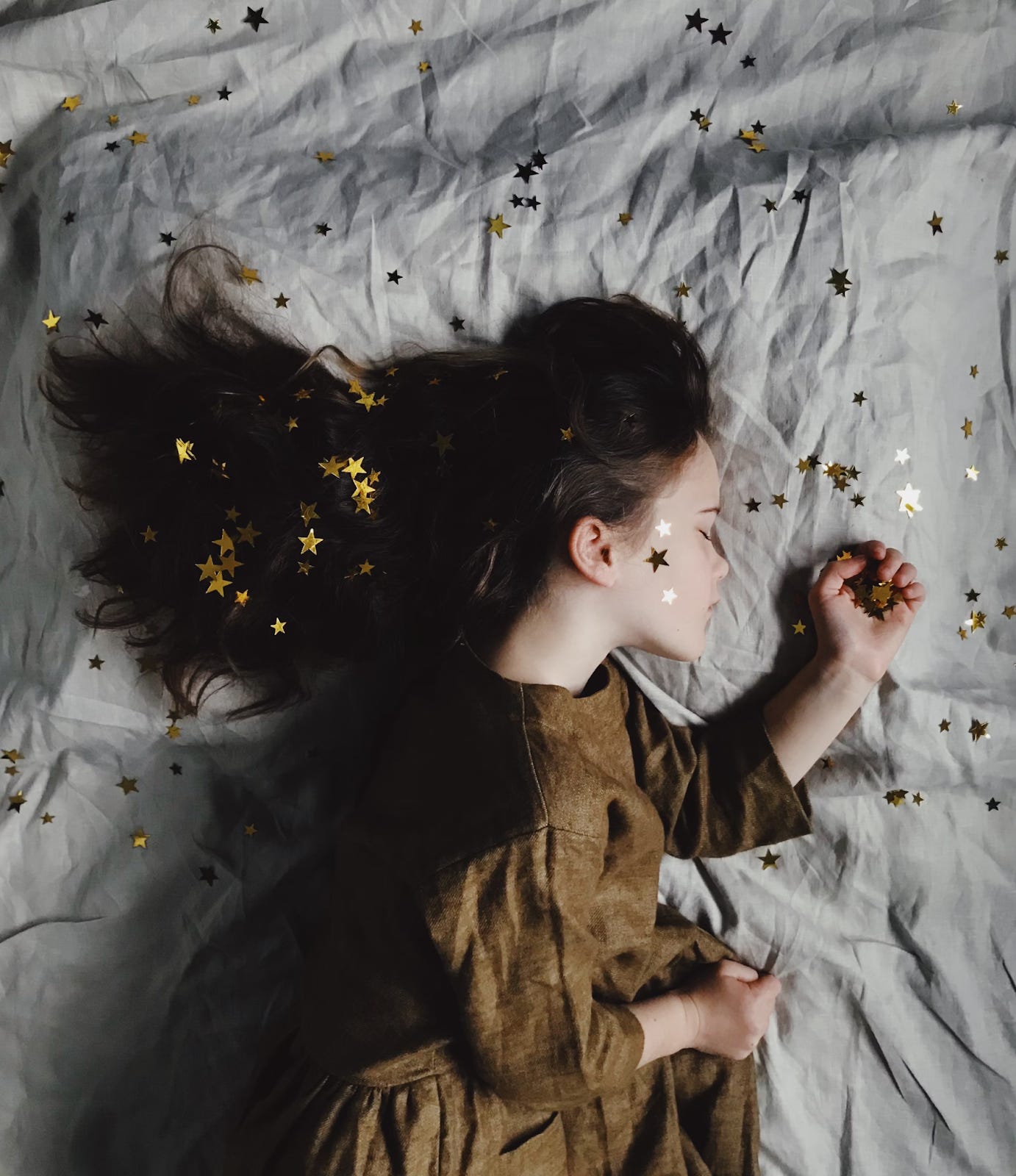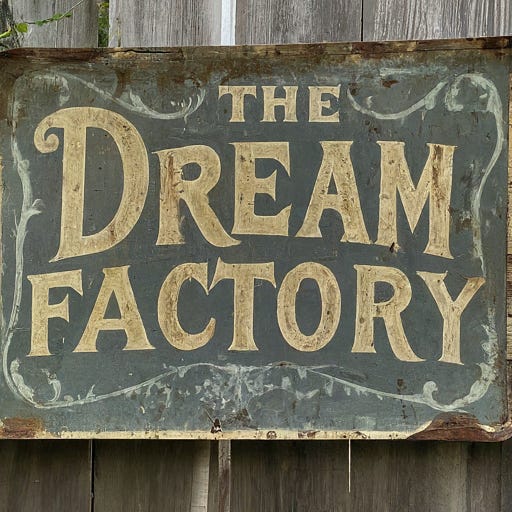Where Dreams Are Born
A short story

“Mommy and Daddy!” Nine-year-old Elizabeth Walters clutched her Pooh Bear’s arm with her left hand as she pushed her parents’ bedroom door open with the other. The door slammed into the wall behind it. “Mommy and daddy, wake up!”
When they didn't move, Elizabeth screeched again, “Wake up!”
“What, what?” her father, Elis, asked as he kicked off the blanket, sending it flying across the room, which then woke Elizabeth’s mom, Gina. “Did you have a bad dream?”
I shouldn’t have asked that Elis thought.
“No.”
“Come here. Get into bed with Mommy and Daddy.” Elis looked at his phone: 4:05 a.m. Dawn’s light was still two hours away.
Elizabeth crawled into the king-size bed between her parents and squeezed Pooh against her tiny body. A curly blonde lock of hair swung over her forehead, just like her mom.
The family photos on the bureau on the far side of the room smiled at them. Together at the beach, at an amusement park, at the grandparents’ house. A flash of lightning momentarily turned night into day, but there was no thunder or rain.
“What happened?” Gina asked.
I know what happened, but maybe it’s something else, something not ominous.
“Did you hear a noise outside your window? The flying squirrels are busy at night.”
“No,” Elizabeth whimpered. She shivered; goosebumps covered her arms and legs.
Elis slipped out of bed, retrieved the wool blanket, and wrapped his daughter like a burrito. “There, there, you’ll be warm now.”
“Mommy and Daddy, I didn’t dream again.”
“I’m sure you just forgot your dream. We usually don’t remember most of them. I sometimes remember my dreams when I wake, but that dream quickly fades, like a rainbow after a storm. But you know you dreamed even if you don’t remember what happened in that dream,” Gina said.
Elizabeth shook her head. “I don’t remember having a dream at all. Not last night or the night before, or the night before that. Not for a long time, it feels.”
Not for twenty-seven days, Gina thought. Nobody in the world has dreamed for nearly a month.
Gina used to dream about being in her high school algebra class on exam day; in that unnerving dream, she hadn’t attended any classes all year. She dreamed about flapping her arms like a bird and flying over mountains. She occasionally dreamed about riding a golden horse and sometimes dreamed about becoming the billionaire head of the hedge fund where she labored as a human resources manager. She dreamed about sailing on a yacht on blue waters near a pineapple tree-covered island with Elis, and from time to time, she was on that same yacht with a muscular, dark-haired stranger.
It means nothing, she’d tell herself after waking. We can’t control our dreams.
Gina had nightmares, too: skeletons chasing her across a decrepit graveyard, drowning, or a burglar shooting her. Now and then, she screamed in her sleep, jarring Elis awake, who held her and comforted her until she fell back asleep.
But for the past twenty-seven days, she had no nightmares, no dreams.
While it took less than twenty-four hours for the world to realize that humanity had stopped dreaming, it wasn't until the following week that scientists understood the consequences of no dreams: without dreams, there are no emotions. All around the world, people lost the ability to feel. Not all at once and not each emotion right away. Love, anger, jealousy, empathy, fear, excitement, greed, sadness, anxiety, hope, envy, frustration, and awe—all lost their potency little by little, like termites consuming a house. Scientists predicted that soon, nobody on Earth would have any emotions.
Very soon.
Complex emotions, such as gratitude and disgust, vanished first because they were the most fragile. Root emotions such as happiness, sadness, and fear whittled away more slowly, but their end was nigh.
Many heralded this as a great step forward for humanity because an emotionless world would be without war. People could deal rationally with global problems like climate change, pandemics, poverty, and equality. Money spent on armies would instead help people.
Typical was this exchange between a Harvard and Yale professor on a Sunday morning news program: “If we’d known that dreams make emotions possible, we would have eliminated dreams sooner,” said the Harvard scholar, a woman in her forties with tortoiseshell eyeglasses.
“And how would you have done that?” the Yale professor asked. He pushed his glasses higher on his nose. His glasses looked identical to the Harvard professor’s.
“I’m sure we could have developed drugs to block dreams without interrupting sleep. We didn’t have the motivation to develop them, but now we don’t need them because, without emotions, there will be no more war, murder, or prejudice. Humanity will achieve its golden era.”
“And what about the love parents have for their children? That will vanish, too.”
“Parents don’t need love to raise children, just as they don’t need emotions to want a roof that doesn’t leak or turn on air conditioning in the summer. Propagation will still be necessary; parents will still make children. Physical sensations aren’t going anywhere. You can still have an orgasm without emotion, just like a cold glass of water on a hot summer day is pleasurable. Without emotions clouding parents’ minds, they’ll raise better children. Parents won’t hit their kids, won’t pressure them to pursue a particular career, won’t yell, won’t abuse kids, won’t force them into arranged marriages. A child’s life will be—”
“Loveless,” the Yale professor asserted.
“No more hate, bigotry, or xenophobia.”
“No compassion or charity.”
“The government can still provide tax incentives for charitable contributions. Racism and intolerance will end.”
“There will be no novels or movies.”
While television commentators discussed the strange future that was already halfway here, dread filled Gina—she could still fear, though that emotion would evaporate soon, too.
No more love, Gina thought. No love among married couples. No child will love their parents. No humans will love their pets. Will we even want pets? What will Elizabeth be to me? What will I be to her? There has to be a way to get our dreams back before it’s too late.
What’s the point of life without love?
Gina closed her eyes as she recalled when she and Elis met in the line for a Ferris wheel in Chicago’s Polk Bros Park. They were both there for the same reason: to cure their fear of heights. It didn’t work, but they went to dinner after, soon fell in love, and married.
While that memory wouldn’t disappear, the incredible giddiness it brought her would. What is a loving memory without love?
Gina wondered if her acrophobia would disappear. Was a fear of heights a type of emotion?
“What’s happening? I miss my dreams,” Elizabeth said.
“I’m sure they’ll be back. There’s nothing to worry about. Anyway, no dreams also mean no nightmares. That’s good, isn’t it?”
“Guess so.”
“Do you think Pooh dreams?” Elizabeth asked.
“He probably does, but only good dreams about the Hundred Acre Wood.”
Three weeks later, at 7:17 p.m. Eastern Time on July 8th, every television in the world blinked on. They all showed the same static image: A factory made of iron on the top of an iridescent grass-covered hill. The factory’s three dormant smoke stacks rose high into the azure sky. When the wind blew, the factory’s rusted orange doors opened and shut.
After a time, several rabbits hopped out of the factory. A fox peeked through the open front door, went inside, and exited five minutes later.
The camera panned to the left and right and then zoomed in above a broken window on the far left side, where a sign read, “The Dream Factory.”
Elizabeth sat on the sofa in the living room between her parents. Her mother held her left hand, and her father held Elizabeth’s right hand.
“Mommy, Daddy, what's the dream factory?” Elizabeth asked. She turned her head toward each of them and tugged their arms to pull them closer.
“It’s…it’s…”
“Where dreams are born,” Ellis said. He narrowed his eyes. “But it’s broken. The dream factory is broken.”
“Can we fix the factory?” Gina asked the television.
A child on the television walked toward the factory door.
Elis dropped the water glass he’d been holding in his left hand. Water spilled all over the carpeted floor.
Another child paraded into the factory, then another and another. Some were blonde or had black hair; some looked Asian, African, or Latino. Kids wore jeans or skirts or sari or robes. They walked, skipped, hopped, and ran through the factory door.
Then, hundreds, thousands, countless children streamed into the factory.
Elizabeth clapped her hands once and stood. “I have to go into the TV, Mommy and Daddy. I have to go to the factory.”
“What do you mean?” Gina asked.
“I’m going to help fix the dream factory.”
Gina glanced at her daughter, then the television. The factory was now operational. Turquoise smoke billowed from the three stacks. The rusty, iron walls morphed into glass. Children operated levers and pulleys. They pushed pendulums and stirred giant vats of rainbow-colored liquids, which they scooped with ladles and poured into funnels at the top of the Rube Goldberg-esque machine. An enormous gold chain like a bicycle chain circled the inside perimeter of the massive structure.
A steam locomotive with a panda bear in the engineer’s compartment circled the factory’s perimeter.
Is that a child’s dream? Gina wondered.
A pair of unicorns with butterfly wings landed in front of the factory.
The camera panned to a room at the far left side of the factory, a dormitory with a seemingly endless array of beds filled with children, none older than ten or eleven, smiling in their sleep.
“You’re going to live there?” Gina asked. “At the dream factory. For how long?”
“For forever, Mommy. The dreams can’t leave the factory anymore, and neither can I. The other kids fixed it, but it’s not as good as it once was. Do you understand?”
Gina scratched her chin. “Not really.”
“The TV told me.”
“I don’t hear anything from the television.” Gina noticed just then that although the television broadcast images, there was no sound coming from the set.
“You don’t hear because you’re a grown-up.”
“My hearing isn’t as good as yours.”
Elizabeth shrugged. “I guess.”
“I see. I’ll make you a lunch first that you can take with you. Would you like an orange or grape juice box?”
I’m supposed to want my daughter to stay, but she wants to go and who am I to interfere with her wishes? The dream factory’s a better place for children, a place where your dreams come true. And look at all those children! Every parent is letting their child go. Gina locked eyes with Elis, who shook his head as if to say, “Let Elizabeth go.”
Elizabeth kissed her parent’s cheeks, stood, and walked to the television. “I don’t need the lunch. Bye, Mommy and Daddy.” She slipped into the television screen and disappeared.
Gina tried to spot Elizabeth among the throngs of children on the television but couldn’t because there were so many. It was like trying to locate someone in a wide-angle shot of the Super Bowl stadium.
Oh well. I’m sure she’ll have a good time. Maybe she’ll find a way to send an email.
Gina thought she was supposed to cry because she would never see her daughter again, but she didn’t know how to, although she remembered crying in the past many times.
The camera panned above the factory, revealing a bright-ringed moon and two red suns.
The camera zoomed in on Elizabeth, an unexpected image that made Gina wonder, How does the camera know to pick my daughter out of the crowd? Or maybe everyone sees an image of their child—somehow. It’s all hard to figure out. But the children seem to know.
Tears streamed down Elizabeth’s face, and her lips quivered. Her eyes were red and puffy. She stared into the television and waved goodbye.
Then the television shut off, a booming click as the world’s TVs went silent simultaneously.
Gina turned to Elis, who had reached into his pocket for a tissue but then put it back without using it. “What do we do now?” she asked.
“I’m hungry. How about dinner?”
Gina’s stomach rumbled. “Yes, me, too.”
Three months later.
Elis jerked up in bed, grabbed Gina’s arm, and shook her. “Wake up, babe. Wake up. You were screaming in your sleep.”
Gina exhaled staccato breaths and turned toward Elis. Her heart thrummed, and cold sweat beaded her forehead. Fragile, pre-dawn red and blue light squeezed between the bedroom’s window frame and shade.
“I had a nightmare. A giant dog was—” Gina bolted upright. “Oh my God. I dreamed. Noooo!”
If you enjoyed Where Dreams Are Born I think you’ll like my short story, New Memories.
New Memories
“If I’d known you were going to be weird, I’d have gone to the party with Jimmy Howe from engineering.” Emma frowned. She slid her fingers through her black hair and tucked it behind her ear. “You’re a nice guy, Ben, but you’re a little off.” She cupped her hands into binoculars and pressed them against her eyes. “I don’t se…




Very creepy as you do so well, and nearly believable. Might give me nightmares!
If it were only possible that everything came from a factory and could be fixed.